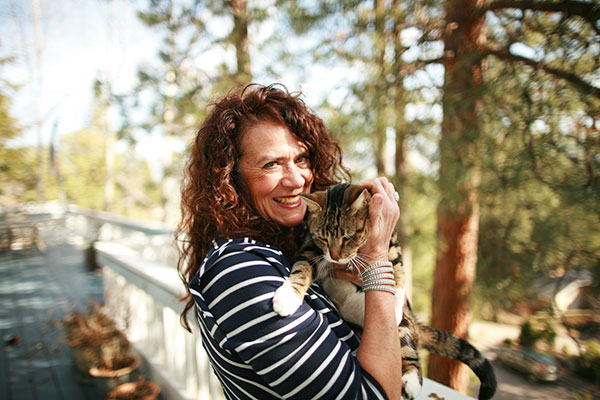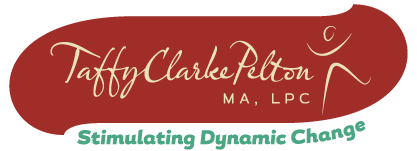
Q: What inspired you to become a counselor?
A: Although I did not become a therapist until midlife, the path to this profession started early in my life as I attempted to make sense of troubled family I grew up in and cope with major losses I suffered when I was young. Fortunately, I had a next-door neighbor who took an interest in me and starting giving me self-help books to read and discuss when I was in my teens. By the time I was in my 20s, the Human Potential Movement was in full swing. I did a lot of encounter groups and therapy, and I have always been intensely curious about all matters of life: what motivates us, what is the meaning of life, why do we suffer, what creates happiness, how change happens, and how do we get and stay healthy in mind, body, and spirit. I was an unofficial therapist to friends, family, and coworkers for many years before I discovered the confidence to become a professional.
Q: What is your background and training?
A: The initial part of my adult life was spent in marketing, sales, and sales management in a variety of businesses. While it was great experience and training, chasing the dollar was never a motivating force for me. Rather, it was the relationships I developed that gave this career meaning. When I was given the opportunity to practice counseling in a holistic health hospital, I realized even though I had been in and out of counseling myself over many years and very involved in the Human Potential Movement, I really knew little. I was inspired then to get a graduate degree in counseling psychology, and I began a private practice right out of school. I’ve since had training in trauma therapies, body-centered therapies such as Hakomi and Sensorimotor, Trance work (a kind of clinical hypnosis), Gestalt, EMDR, Bowen Family Systems Therapy, and Cognitive Behavioral Therapy. I have coauthored two books on natural health, and I am certified as a life coach and yoga instructor.
Q: How did your experience in the business world prepare you for your current work?
A: I have a great deal of practical, real-world experience that helps me understand the issues of so many of my clients, especially in assisting them with finding their life’s work or passion or dealing with personal and political struggles within organizations. It’s also a great background to help clients with strategizing and implementing goals geared toward professional achievements. Most importantly, my understanding that the quality of relationships is key to career success helped me focus my clients on increasing their relational skills and enhancing emotional intelligence.
Q: What is the essence of your counseling philosophy?
A: So often people come to me saying they want to be fixed, but I think that’s the wrong premise. It assumes they are broken or something is wrong with them, which is the basis of shame, the core belief that keeps us from experiencing joy and satisfaction in life. My message is about discovering that we are whole, that we already have within us the resources and wisdom to create rewarding lives and relationships. So therapy becomes the process of uncovering and focusing on strengths, skills, and abilities to illuminate and move beyond patterns, habits, and beliefs that hinder satisfying relationships and life fulfillment.
Q: Can you describe your approach to the counseling process?
A: I approach therapy from a holistic and integrative perspective. Rather than focusing on the psyche or psychopathology, I take the whole person into account. In planning treatment, I take the mind, body, spirit, social, and cultural aspects of a person into consideration and select the type of therapy appropriate for each unique individual. I believe therapy works best when it is a combination of gaining awareness and insight and then experimenting with new behaviors, practicing positive states of being, and using new tools to put insight into action.
Q: What is the difference between therapy and coaching?
A: Therapy or counseling and coaching both endeavor to assist people with making changes for a happier, more fulfilling life and relationships. While the structure and approach are different, both are valid methods of making personal change. Therapy focuses more on inner work, discovering how the past is still alive in the present, working through trauma, grief, and unresolved family of origin issues. Coaching is more about assessment of current functioning in any given area, and then strategic planning how to move from the present to a desired outcome in the future.
Q: What are your areas of specialization?
- Relationships & Intimacy
- Marriage Counseling
- Anxiety, Depression, Panic
- EMDR
- Trauma Resolution
- Chronic Illness
- Midlife, Aging Issues
- Spiritual Issues
- Life Transitions
- Life & Wellness Coaching
Q: You’re also an author and speaker. Can you tell us about the subjects you explore in your books?
A: I’ve written two books and am beginning a third in collaboration with my husband, Ross, a specialist in natural health and a pharmacist who has the capacity to bridge natural and conventional medicine. The first book looked at mind-enhancing drugs and nutrients and how to prevent brain aging; the next came out of the years we worked in a holistic health hospital in Mexico, where we witnessed so many women at all stages of breast cancer and realized the only prevention to breast cancer that was being talked about was early mammograms. Understanding that 20% of the risk factors were lifestyle, we felt it was important to write a book on breast cancer prevention. In addition to speaking about topics raised in these books, I have also developed seminars on life balance and stress reduction, the mind-body approach to health and wellness, midlife transition, and healthy longevity.
Q: What sets you apart from other counselors in the Rogue Valley?
I connect with people at a deep level and gain their confidence so they feel comfortable opening up and sharing their issues and deepest feelings. I go to the heart of the matter quickly, and I listen carefully and act on what a client wants. I help them experience themselves in new ways early in the therapeutic process and offer tools and new behaviors to practice outside of session. The breadth and depth of my experience and the capacity to draw from many modalities attract clients to me. With a background in health, wellness, and yoga as well as psychology and spirituality, a person can get a wide range of their needs met while working with me.
Q: Who are your clients? What kinds of issues are they facing?
A: I work with couples, individuals, and families at ages ranging from 10 to 85. I typically work with business and health professionals, people who are dedicated to personal and spiritual growth, and people of all ages dealing with life transitions. Most often people are brought in by some disruption in relationships or the desire to improve and refine their capacity to relate to life partners, family members, or coworkers. I also see people dealing with chronic and life-challenging illness or people who just want to improve their physical and psychological health. And certainly people present with a variety of disorders—depression, anxiety, mood disorders—and while it’s important to pay attention to pathology, what people most want is to evolve and find more joy in living.
Q: What are some of the tools you use when working with a client?
I begin by hearing a client’s story. “Getting stuck in your story” in popular psychology is considered a bad thing these days, and yet when I really listen to not only the larger story of someone’s life but even current events, I can hear how well clients bonded early in life (attachment histories/status), on what beliefs the clients’ brains were developed, developmental traumas that account for many compensatory patterns in present-day life, worldview, recurring beliefs about themselves and their relationships, and so on. From there, I might do some cognitive work to restructure self-limiting beliefs, teach mindfulness skills, or go deep into the body through mindfulness or a mild trance and discover what is being held in the body and help it move through. I might also employ EMDR, a modality that uses bilateral stimulation to access and process trauma, change outmoded beliefs, and enhance new states and ways of thinking. I may assign homework such as an appropriate book, workbook, or movie. There are many other tips and tricks I apply as stimulated by client need, but mostly, I feel my job is to be exquisitely present and to develop the kind of relationship with my client that can be a corrective experience, modeling how to have the best and most satisfying relationship in the world outside of therapy.
Q: What do you love most about relationship counseling?
A: What I’ve learned over the years is that conflict or disturbance in relationships is actually an important stimulus to personal and spiritual growth. Relationships create valuable feedback and mirroring through which clients can gain a deeper understanding of their histories, behavior patterns, deep-seated beliefs, talents, and passions. From this, clients not only make changes in the quality of their relationships but can make new and positive changes in all aspects of their lives. It is exciting when I’m working with a couple locked in conflict, and as one partner is exploring a deep unrelenting pattern and its origins, the other partner can understand rather than dislike the behavior and extend a hand in compassion. I know then I’ve done my job.
Q: How do you help clients deepen their understanding of themselves and their loved ones?
A: I invite people to begin to listen to themselves carefully and deeply, and we take plenty of time to do so. It is so easy to get caught in our own internal conflicts or stuck with repeating negative self messages that it’s hard to tease apart who we really are from all the different judgments we have developed about ourselves. I help clients learn how to witness or observe themselves, essentially how to navigate their lives more mindfully. This skill allows for more self compassion and results in greater compassion and understanding for their loved ones.
Q: When your clients leave a session, how do you want them to feel about themselves and their relationships?
- Better and more open communication with partner/spouse, less defensiveness, and fewer power struggles
- Regaining hope in love and the future
- The ability to move forward into commitment
- The courage to create the space for new potential partners
- New skills for dealing with conflict
- Finding alternate behaviors to old, tenacious patterns of relating
- Freedom from an overactive inner critic
- Enhanced self-esteem
- The courage to set new boundaries and no longer be victimized
- Greater sense of self and personal power
- More fun and contentment in the workplace
- Enhanced career paths
- Feeling loved and connected
- Getting needs met
- Improved relationships
- Greater inner peace
- More effective communication
- Diminished anger and fear
- Relief from pain and grief
- More relaxed
Q: What is the most gratifying aspect of your work?
A: I love that light bulb or aha moment when someone who has been stuck in a mode of thinking has an insight that suddenly clears the fog, and they realize they have the option to make a new choice about how they feel or think about something important. Ultimately, I feel honored and grateful to walk next to someone as they discover how to make more life satisfying, create better or new relationships, find their life’s passion, or find deep internal peace.
